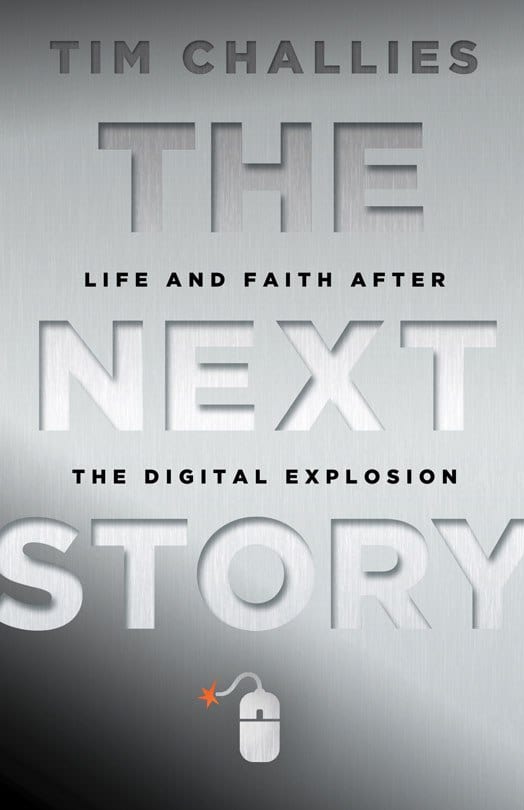I have that feeling to look over my shoulder, yet I know there’s nothing lurking behind me, because I know right where it is. It’s in my pocket, in my car, in my office, and on my desk. It’s at my local coffeehouse and even in the air at the park where I take my girls in the afternoon. The world we live has been forever changed by digital technologies. Though we live in a digital culture, technology is nothing new. So why a sense of mounting pressure, strain and stress? Shouldn’t this reality make our lives easier? In The Next Story: Life and Faith After The Digital Explosion, author and bloggers Tim Challies explains how and why our society has become reliant on digital technology, what it means for our lives, and how it affects the Christian faith.
The book’s first section takes up technology in the areas of theology, theory, and experience. When we begin to understand our purpose in being created, remember the consequences of the fall, and recognize the power of our own sinful desires when we use technology, then we will have a theological foundation to use technology in a distinctively Christian way. Second, when we see that every technology always involves benefits and drawbacks, understand the medium is the message, and realize that technology changes the structure of life, then the theoretical edifice is in place. The first section concludes with a historical overview of how the digital revolution came about.
Part two takes up areas of application specific to the Christian life, “showing how we can live with wisdom and virtue in this digital world, using our technologies without being used by them.” Each chapter ends with penetrating questions fueling action based on what we just read. Challies works to get his readers into the sweet spot where theology, theory, and experience intersect. This occurs when a person uses technology with an understanding of both the affect it has upon life and how God intends technology to function in his world.
There is plenty to praise in The Next Story. First, it is a wake-up call. Some families, knowingly and unknowingly, are enslaved to technology. Challies graciously comes alongside those who do not see it and helps them understand what has happened and what is at stake. On the other hand, those who do know it but don’t know what to do about it, will not only find help in coming to grips with why its easy to be enslaved to technology, but will also find help in turning the tables on it, making it serve us and our end of glorifying God in all things. Pastors and parents will find wise council in how to raise up disciples of Jesus who will master technology rather than be mastered by it.
Second, technology’s power to turn our hearts to idolatry is highlighted. As we know, the heart is always looking to raise up new gods. Digital technologies have such potential to help us go hard after God, “but far more commonly, digital technology is a means to further the power of other idols. Technology, a good gift from God, is a gift that gets perverted and used to satisfy our selfish and evil desires.” A gut-level response may be to flee or avoid technology as the idols of significance, information, and productivity abound. Challies rightly calls Christians to follow Christ by the light of his Word to use technology to the glory of God and the spreading of the fame of his name across the globe.

The Next Story: Life and Faith After The Digital Explosion
Tim Challies
Even the least technical among us are being pressed from all sides by advances in digital technology. We rely upon computers, cell phones, and the Internet for communication, commerce, and entertainment. Yet even though we live in this “instant message” culture, many of us feel disconnected, and we question if all this technology is really good for our souls. In a manner that’s accessible, thoughtful, and biblical, author Tim Challies explains how and why our society has become reliant on digital technology, what it means for our lives, and how it impacts the Christian faith.
Another strength is the examination of the relationship between technology and human identity and character. Challies looks at the perpetual connectivity in our day and shows how much danger is lurking. It is remarkably easy to speak or type or text words devoid of any substance or biblical character. It is remarkably easy to live for the next upgrade or new gadget and quickly establish a device as part of our very identity. Challies calls the church to speak the truth in love at all times in this age of pervasive communication. He challenges us to find our identity in what God reveals to us in his word rather than in what we do or do not have.
This book is filled with wisdom that will help people of all ages understand the digitial revolution and how it has changed our world. Challies readies his readers to be discerning Christians in their use of technology by continually going back to our hearts. In the church, it is easy to reject technology or completely embrace it. Challies does a fine job preparing people to walk the middle road of biblical discernment. The Next Story is an excellent resource for pastors, parents, and many others as they seek to use technology and help others use it for the glory of God in this strange, new, digital world.

































